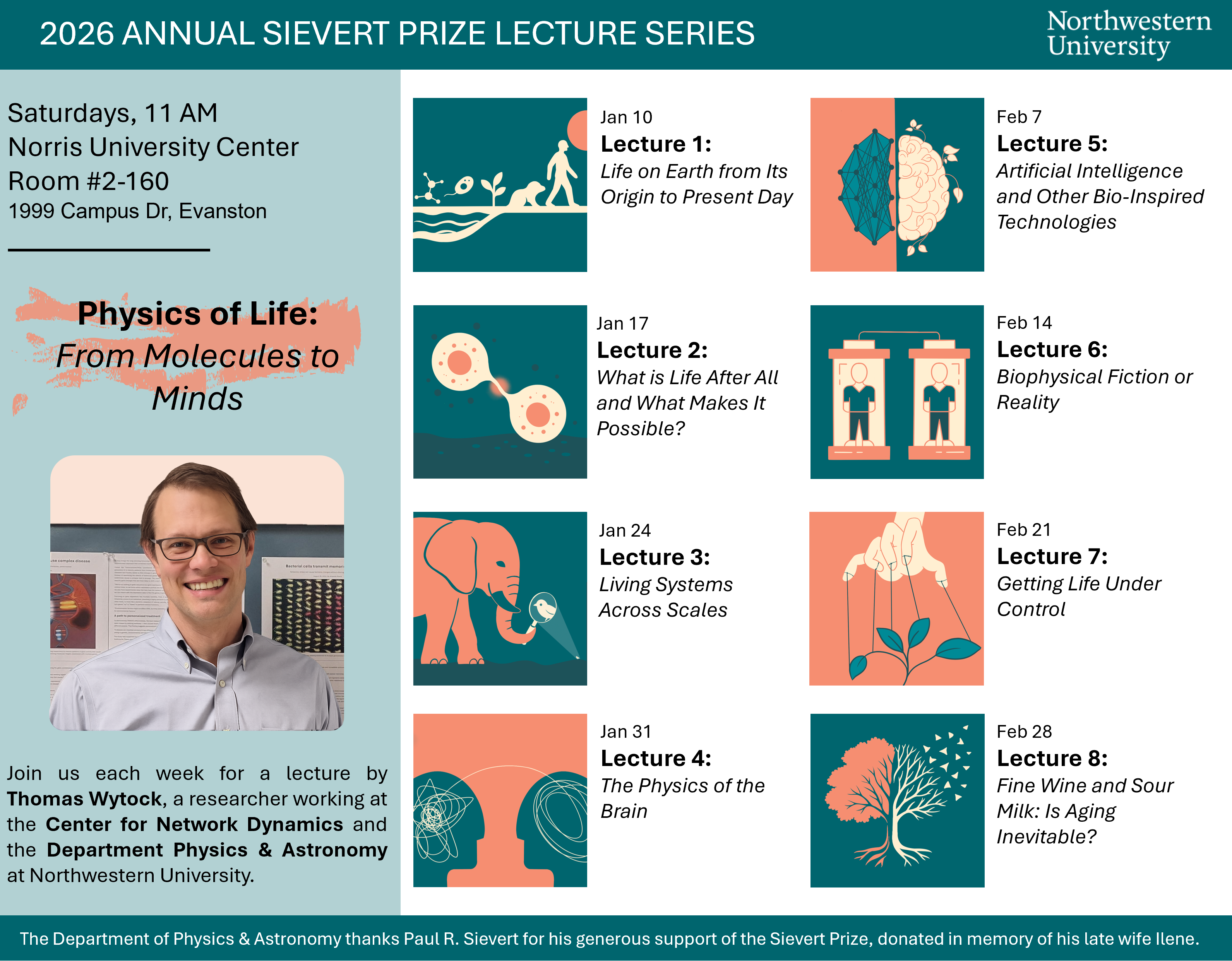Sievert Prize Lectures

- January 10- Life on Earth from Its Origin to Present Day
- Today, it's easy to take the sheer diversity of life on Earth for granted and view it as an inevitable outcome of physical laws---but is it? We will explore this question by tracing an abridged history of life from the primordial chemical and physical processes believed to start it, to the key steppingstones in complex evolution, to the events that led to modern humans. View recording
- January 17- What is Life After All and What Makes It Possible?
- Living organisms are built out of cells, which serve to segregate the organism from the environment. Cells across the kingdoms of life share common processes to acquire energy from the environment to grow, interact, and reproduce. These shared qualities raise the question: how do we scientifically define "life"? View recording
- Janaury 24- Living Systems Across Scales
- Organisms of different sizes face distinct energetic challenges and yet, they are related by common allometric scaling laws. Why does evolution seem to repeatedly arrive at the same body proportions? We will address this question by exploring how common mechanisms lead to diverse pattern formation across a wide range of plants and animals. View recording
- January 31- The Physics of the Brain
- The brain is the most energy-efficient computational device yet encountered, requiring only about 20 Watts of power to sustain the physical processes that govern brain function, including thought and consciousness. We will delve into these processes in addition to the physics underlying the still unsettled question of free will. View recording
- February 7- Artificial Intelligence and Other Bio-Inspired Technologies
- Biologically inspired technologies are ubiquitous, including the airplane, sonar, and even machine learning broadly construed-from genetic algorithms to artificial intelligence. We will investigate how life inspired these technologies, and what the technologies themselves teach us about biophysics in return. View recording
- February 14- Biophysical Fiction or Reality
- To what extent are the possibilities of brain-machine interfaces, thought-reading through brain scanning, chimeric organ transplants, and human cloning constrained by science? I will explore the prospects of realizing these and other far-fetched-sounding technologies. View recording
- February 21- Getting Life Under Control
- Life has evolved sophisticated regulatory and control mechanisms, from cells regulating protein production to neuronal circuits generating movement patterns. We will examine these regulatory mechanisms and discuss how we can intervene to elicit desired behaviors in biological systems. View recording.
- February 28- Fine Wine and Sour Milk: Is Aging Inevitable?
- Age comes for us all, from the scale of our whole bodies to the subcellular level. We will explore the physical mechanisms behind aging, examine organisms that manage extreme longevity, and discuss whether this holds any lessons for us humans.
These lectures are free and open to the public. Free parking is available in the South Campus Parking Garage (1841 Sheridan Rd, Evanston).
The Norris University Center is located at 1999 Campus Dr, Evanston, IL. Click here for directions
View the Sievert Prize Lecture Archive
The Department of Physics and Astronomy thanks Paul R. Sievert for his generous support of the Sievert Prize at Northwestern University. Paul Sievert created this endowment in memory of his wife, Ilene B. Sievert in 2020 in order to strengthen the Physics and Astronomy program at Northwestern for the benefit of the Northwestern community and the general public. This prize is awarded to one or more postdoctoral researchers in the department.
About the Ilene B. Sievert Prize Lectures
This series of lectures was established and endowed by Paul R. Sievert to honor the memory of his late wife Ilene (9/5/1940 - 12/16/2012).
Ilene was an undergraduate at the University of Chicago when she married another undergraduate, a physics student, Paul, in 1960. She had started in biology but switched to her second major interest, English literature after her marriage.
She obtained her B.A. and then took a job in the Computer Institute eventually working as one of Nick Metropolis’s programmers. She programmed an early machine, the Maniac III. Paul went on to graduate school at U. of Chicago.
Eventually Paul and Ilene came to Evanston in 1974. Paul became CEO of Allied Valve Industries in Chicago while Ilene was a housewife and mother. After her children were sufficiently grown she went back to her first interest, biology, specifically herpetology. She raised and studied poison dart frogs and published a number of papers on herpetology in the journal of the Chicago Herpetological Society. She had a lively interest in evolutionary theory, one of her favorite books being the Origin of Species by Darwin. Others included the evolutionary writings of Gould and Dawkins. She also followed her husband’s continuing interest in physics.
Ilene also served for a time as the president of the PTA for Park School in Evanston. Park School is for mentally handicapped children and is where her son attended. She had many friends in Evanston and some from her time at U of C, including John Ketterson, a current faculty member in the physics department at Northwestern University. Her interest in science and the knowledge that she certainly would have attended these lectures is one of the main motivations for the endowment of this prize.
The purpose of these lectures is to present to the interested general public cutting edge research results in hard science by an up-and-coming researcher in the field.
The topics could cover any field in science: biology, physics, chemistry, astronomy, mathematics, etc. The number of lectures and the depth of presentation is such that the intelligent general public should be able to follow and come away with an understanding and appreciation for a current subject of research and its importance. Though this prize program is being administered by the Physics Department of Northwestern University, other hard science departments of Northwestern will be consulted as prize recipients and lecture subject.
